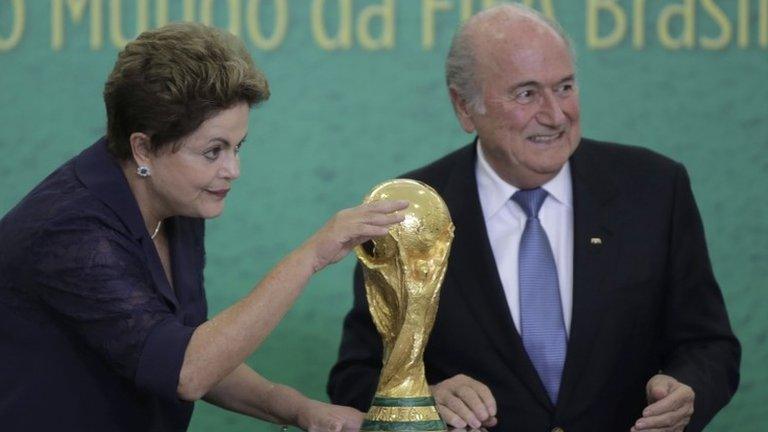Brazil: Metro strike halts Sao Paulo ahead of World Cup
- Published
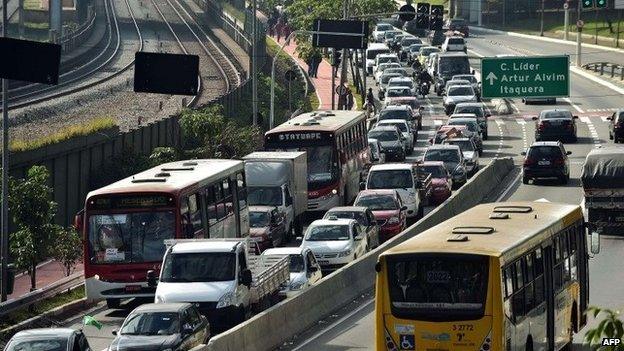
Traffic queues were longer than usual in the early morning commute
A public transport strike has caused traffic chaos in Brazil's largest city, Sao Paulo, a week before it hosts the opening match of the World Cup.
Half of all underground stations were closed as transport workers walked out, demanding a 10% pay rise.
Angry commuters stormed the Itaquera station, nearest the stadium where Brazil will play Croatia on 12 June.
Police and other public sector workers say they will also strike in the next few weeks if their demands are not met.
This is the latest setback in Brazil's preparations for the World Cup, which have been criticised by the tournament's global organisers.
But Fifa President Sepp Blatter has called on the Brazilian people to do all they can to support the World Cup.
"We at Fifa, we are confident. It will be a celebration," Mr Blatter told reporters as he arrived in Sao Paulo amid the traffic chaos.
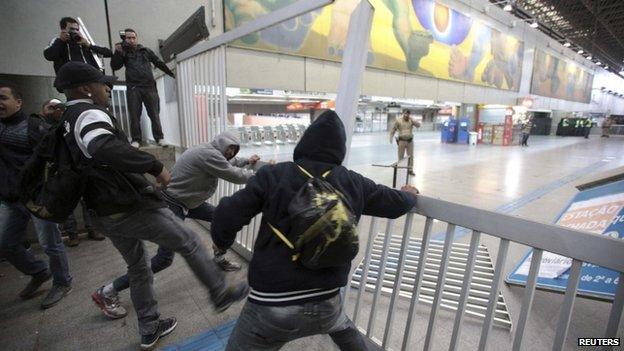
Commuters knocked down barriers set up by striking workers at the station closest to the Itaquerao stadium
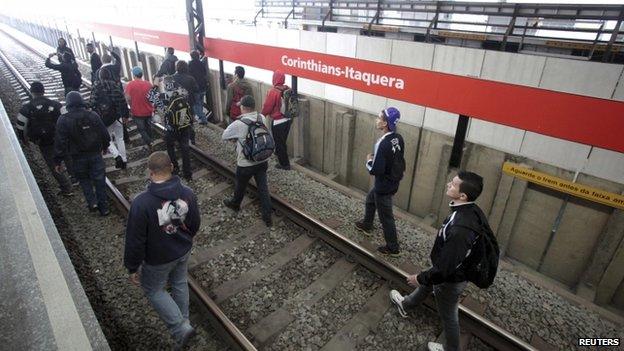
"We need to go to work," shouted commuters before jumping on the tracks at the Itaquera station.
The state-owned underground company has offered a 8.7% pay rise, which was rejected by the unions which declared the strike for an undetermined period.
The authorities said they would sack staff if they failed to meet legal requirements and keep at least 70% of public transport services running.
"The government will not be complacent," said Sao Paulo state Transport Secretary Jurandir Fernandes.
"If we gave them a 10% rise, all other state workers would demand the same," Mr Fernandes told Folha de Sao Paulo newspaper.

By Katy Watson, BBC South America Business Reporter, in Sao Paulo
Even some of Fifa's executives could not avoid the problems caused by the strike, as they sat in traffic jams for hours, trying to get across the city.
Union leaders on Sao Paulo's metro system deny the strike has anything to do with the World Cup, but everything to do with needing higher salaries to keep pace with inflation.
The underground company was locked in negotiations with unions on Thursday afternoon and the government is under a huge amount of pressure.
The only viable way for fans to reach the Itaquerao stadium is on public transport. If that fails, it will not just be a huge inconvenience for visitors, but a huge embarrassment for the government too.
Experts here think the government will have to give in to these demands, at least for the short term.
But that is not something that will go away. After the World Cup come the presidential elections and another opportunity to keep up the pressure.

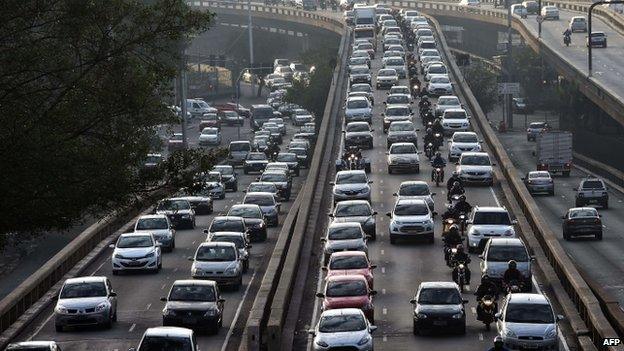
Greater Sao Paulo, with an estimated population of 20 million people, is notorious for its traffic problems
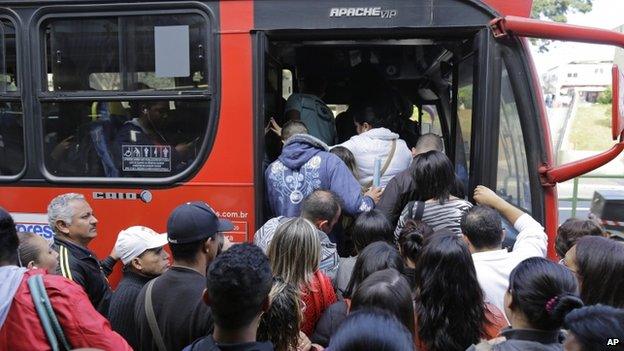
People trying to get into work said there was chaos and lack of proper information
Brazil has seen a year of street protests against bad governance and perceived excessive spending in preparations for the World Cup and the Olympics, which Rio de Janeiro will host in 2016.
The movement began in the city of Sao Paulo just over a year ago, with commuters protesting against a public transport fare rise.
Many Brazilians say, however, that they are tired of protests and strikes. They say the country should enjoy the unique occasion of hosting the World Cup.
"The strikes are getting on my nerves," said Silvia Rodrigues da Silva, who manages a coffee shop in the city centre.
"The metro station nearest my house was closed so I had wait for more than an hour to get into an overcrowded bus to come to work," she told the AP news agency.
Last week hundreds of bus drivers also went on strike over pay.
- Published5 June 2014
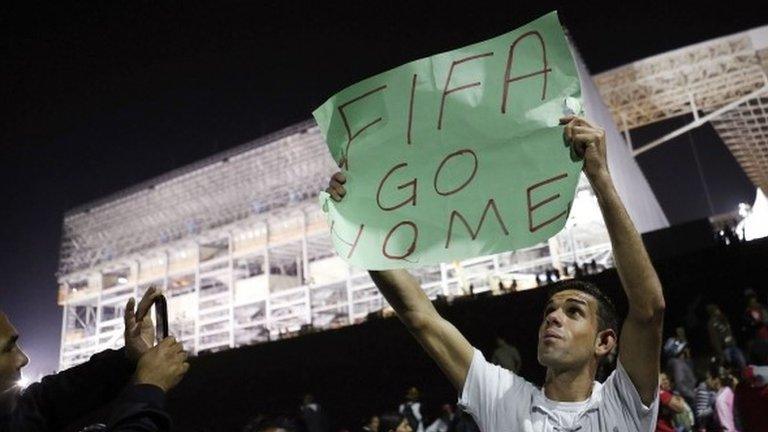
- Published4 June 2014
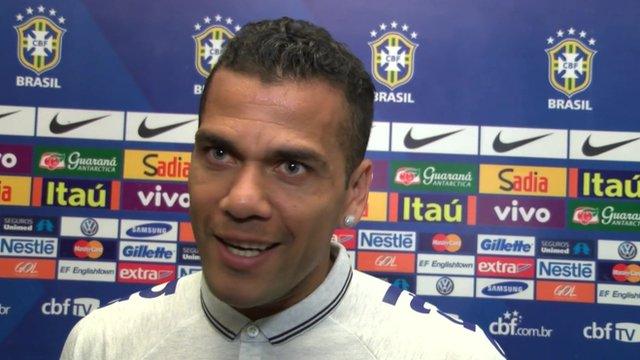
- Published5 June 2014
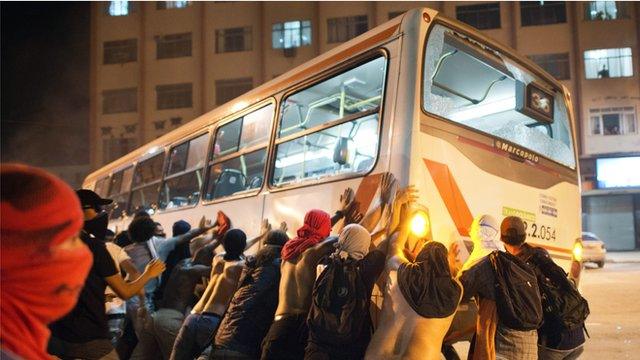
- Published4 June 2014
